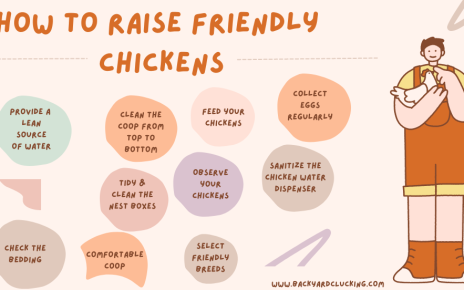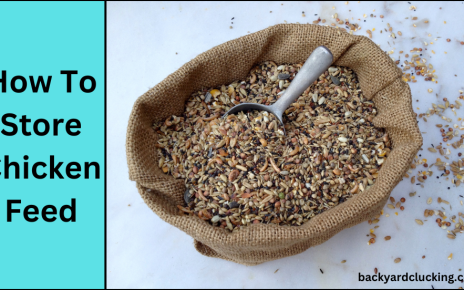Chickens are one of the most common farm animals. City-dwellers and rural farmers can spot them by their familiar clucks and crows. But despite their ubiquity, there’s still a question that remains unanswered: why do chickens scream?
The reasons are more complex than you may think. Chickens have developed a wide range of vocalizations over millions of years. In this blog post, we’ll dive into these sounds and examine why chicken vocalizations evolved in the first place. So keep reading if you’re curious about what makes chickens scream!
Why Do Chickens Scream
Chickens often scream to communicate danger or stress. They usually do this because they’re afraid so the others in the flock know potential threats.
Also, screams can show social communication, like chickens screaming to assert their place or showing excitement or frustration. By understanding these vocalizations, we can better care for these animals.
The Top 6 Reasons Why Some Chickens Scream Loudly
Fear or Stress
Chickens may scream due to perceived threats in their environment. If a flock member experiences fear or stress, they may scream as an alarm call to notify other members of the danger. Common causes of anxiety or stress in chickens can include:
- Predators.
- Loud noises.
- Sudden changes in their environment.
- The presence of unfamiliar objects or animals that they perceive as potential threats.
Hunger or Thirst
A screaming chicken might simply be trying to express its needs to their caretaker. When chickens lack water or food, they can become quite vocal, alerting their owners to their hunger or thirst.
Regularly monitoring food and water levels throughout the day, providing a balanced diet, and ensuring access to clean water can help keep your chickens’ needs attended to and their screaming to a minimum.
Laying Eggs
Sometimes, a chicken’s scream may be related to laying an egg. Egg-laying can be uncomfortable or even painful for some chickens, which may lead them to vocalize their discomfort.
Regularly monitoring hens is essential to ensure a healthy and safe laying process. Providing nesting boxes with soft bedding material and a calm and quiet environment can help alleviate their discomfort.
Desire for Attention
Chickens are social animals and sometimes scream to engage with their owner or fellow flock members. Screaming may serve as a means to receive attention or even to establish dominance within the group hierarchy.
Spending quality time with your chickens, providing them with social interaction and enrichment activities, and maintaining a consistent routine help fulfill their need for attention and minimize excessive screaming.
Illnesses or Diseases
A chicken experiencing pain or discomfort due to an illness or disease may scream as a means of coping or drawing attention to its ailment.
Keep an eye out for any signs of illness, such as lethargy, changes in appetite, abnormal behavior, or physical symptoms like swelling or discharge, and consult with a veterinarian if you suspect your chicken may be suffering.
Prompt medical attention and appropriate treatment can help alleviate their distress and reduce screaming.
Aggression or Territorial Disputes
Another potential cause for screaming in chickens could be aggression or territorial disputes among flock members. Chickens that are jockeying for position or defending their space may engage in screaming to assert themselves.
Providing enough space, ensuring a balanced flock with compatible personalities, and implementing appropriate measures to manage aggression can help reduce conflicts and minimize excessive screaming.
How to Deal With Screaming Chickens
First, try to understand why your chicken is screaming. Is there a nearby threat? Are they hungry or sick? Once you’ve identified the cause, you can take steps to address it:
- Provide a Safe Environment: Keep your chickens safe from predators and environmental threats by having a secure coop and a fenced yard. This will reduce your chickens’ stress and make them stop screaming.
- Offer Enough Food and Water: Ensure your chickens have enough food and water. Chickens can get stressed when there isn’t enough, which leads to more noise.
- Give Them Space: Chickens need space to move and be natural. Too much crowding can lead to stress and more screaming.
- Monitor Health: Regular health checks can help you catch and treat illnesses early, reducing the likelihood of distress calls.
- Maintain a Routine: Chickens need a routine to be happy, so try not to change their feeding or cleaning times. This way, they won’t get stressed.
Frequently Asked Question
Why does my chicken make a screaming sound?
Chickens scream for different reasons, like feeling threatened, excited, or uncomfortable. Knowing their vocal signals ensures they’re happy and cared for. If your chicken screams a lot, investigate and fix the problem to keep the flock healthy and peaceful.
How do you stop chickens from screaming?
To prevent chickens from screaming, maintain their health, ensure a stress-free environment, monitor for distress, maintain a routine, and respect their social structure. Consult a poultry expert or veterinarian if the screaming persists.
What is a chicken scream called?
A chicken scream is a squawk. Its loud, harsh sound is vital for the flock, from signaling danger to expressing distress or excitement. It’s part of their complex vocal language.
Conclusion
Chickens are fascinating because of their complex language systems. They use vocalizations to communicate emotions and signals like fear, distress, excitement, and contentment.
By understanding these sounds, we can care for these animals better and reduce stress. This understanding also improves our poultry management skills and increases our appreciation for these creatures.



